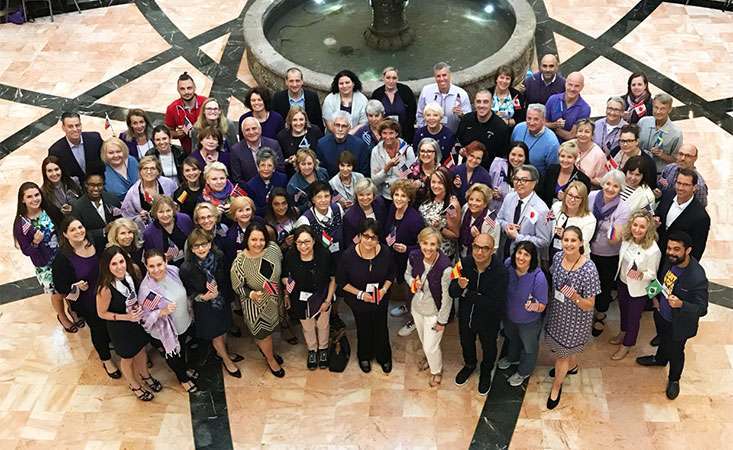
World Pancreatic Cancer Coalition members gathered for their annual meeting earlier this year.
This year’s World Pancreatic Cancer Coalition (WPCC) meeting may be over, but the important work to grow the Coalition and take it to the next level in 2018 and beyond is only just beginning.
For the third year in a row, representatives from pancreatic cancer patient advocacy groups from around the globe came together for the WPCC annual conference. An astounding 40 organizations from 22 countries gathered to exchange ideas on how they can work together to heighten awareness and improve patient outcomes.
74 members. 31 countries. 6 continents. We are more powerful together. Thank to everyone for coming to #DemandBetter for all pancreaticcancer! pic.twitter.com/5hqO6UnqzJ
— W P C (@worldpcc) May 10, 2018
Every day, more than 1,000 people worldwide are diagnosed with pancreatic cancer, and an estimated 985 will die from the disease. While the rate of survival varies country by country, in the United States, the five-year survival rate for pancreatic cancer is just 9 percent.
To Jenny Isaacson, PanCAN’s vice president of strategic partnerships and projects, this presents a huge need for global collaboration to change the statistics.
“We can more quickly and efficiently improve these statistics by working together,” Isaacson said. “Through global collaboration, Coalition members raise awareness of pancreatic cancer and strengthen the capacity and individual efforts of all member organizations. Our mission is to drive transformational change for all those affected by pancreatic cancer.”
Another topic of discussion: World Pancreatic Cancer Day (WPCD), which falls on Nov. 15 this year. The goal of WPCD is to increase knowledge of pancreatic cancer symptoms and risks of the disease at a worldwide level. But dedicating one day isn’t enough, the advocacy groups agree. As part of the three-day conference, WPCC members discussed ways to make pancreatic cancer awareness part of the Coalition’s year-round messaging.
While the conference was a successful one, Coalition members know the work ahead won’t be easy.
“What we’re all trying to do is really hard,” Isaacson said. “This is a tremendously difficult disease to tackle, and there’s no right or wrong way to go about it because there’s no existing roadmap to follow. Add to that the complexity of working with members from numerous different countries where healthcare, policy-making, insurance, cultures, languages and so on are all different, and it becomes an even harder challenge to overcome.”
But Isaacson said, despite difficulties, members are stronger together, and this past week strengthened their resolve and commitment to collaborate in order to dramatically improve patient outcomes across the world.
PanCAN and WPCC members extend gratitude to “Visionary Sponsor” Celgene, “Accelerator Sponsors” Novocure and Shire and “Ally Sponsors” Halozyme, Immunovia and Ipsen.
















